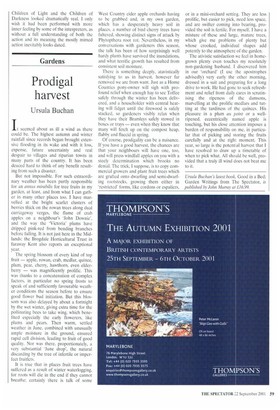Gardens
Prodigal harvest
Ursula Buchan It seemed about as ill a wind as there could be. The highest autumn and winter rainfall since records began brought extensive flooding in its wake and with it loss, expense, future uncertainty and real despair to villages and riparian towns in many parts of the country. It has been deuced hard to think of any benefit resulting from such a disaster.
But not impossible. For such extraordinary weather has been partly responsible for an annus mirabilis for tree fruits in my garden, at least, and from what I can gather in many other places too. I have marvelled at the bright scarlet clusters of berries thick on the rowan trees along dual carriageway verges, the flame of crab apples on a neighbour's 'John Downie', and the way the 'Victoria' plums have dripped pink-red from bending branches before falling. It is not just here in the Midlands; the Brogdale Horticultural Trust in faraway Kent also reports an exceptional year.
The spring blossom of every kind of top fruit — apple, rowan, crab, medlar, quince, plum, pear, cherry, hawthorn, even elderberry — was magnificently prolific. This was thanks to a concatenation of complex factors, in particular no spring frosts to speak of and sufficiently favourable weather conditions the season before to ensure good flower bud initiation. But this blossom was also delayed by about a fortnight by the wet winter, giving extra time for the pollinating bees to take wing, which benefited especially the early flowerers, like plums and pears. Then warm, settled weather in June, combined with unusually ample moisture in the ground, ensured rapid cell division, leading to fruit of good quality. Nor was there, proportionately, a very substantial 'June drop', the natural discarding by the tree of infertile or imperfect fruitlets.
It is true that in places fruit trees have suffered as a result of winter waterlogging, for roots will die in the end if they cannot breathe; certainly there is talk of some West Country cider apple orchards having to be grubbed and, in my own garden, which has a desperately heavy soil in places, a number of bird cherry trees have faltered, showing distinct signs of attack by Phytopthera root rot. Nevertheless, in my conversations with gardeners this season, the talk has been of how surprisingly well hardy plants have survived the inundations, and what terrific growth has resulted from consistent soil moisture.
There is something deeply, atavistically satisfying to us in harvest, however far removed we are from want. Just as a Home Counties pony-owner will sigh with profound relief when enough hay to see Toffee safely through the winter has been delivered, and a householder with central heating will fidget until the firewood is safely stacked, so gardeners visibly relax when they have their Bramleys safely stowed in boxes or trays — even when they know that many will fetch up on the compost heap, flabby and flaccid in spring.
Of course, prodigality can be a nuisance. If you have a good harvest, the chances are that your neighbours will have one, too, and will press windfall apples on you with a steely determination which brooks no denial. The trick, I suppose, is to copy commercial growers and plant fruit trees which are grafted onto dwarfing and semi-dwarfing rootstocks, growing them either in 'restricted' forms, like cordons or espaliers, or in a mini-orchard setting. They are less prolific, but easier to pick, need less space, and are swifter coming into bearing, provided the soil is fertile, For myself, I have a mixture of these and large, mature trees, which give me problems of plenty but whose crooked, individual shapes add potently to the atmosphere of the garden.
The ativistic satisfaction we feel in homegrown plenty even touches my resolutely non-gardening husband. I discovered him in our 'orchard' (I use the apostrophes advisedly) very early the other morning, dressed in a suit and preparing for a long drive to work. He had gone to seek refreshment and relief from daily cares in scrutinising the ripeness of the damsons, marvelling at the prolific medlars and tutting at the tardiness of the quinces. His pleasure in a plum au point or a wellripened, eccentrically named apple is touching, but his close attention imposes a burden of responsibility on me, in particular that of picking and storing the fruits carefully and at the right moment. This year, so large is the potential harvest that I have resolved to draw up a timetable of when to pick what. All should be well, provided that a truly ill wind does not beat me to it.
Ursula Buchan 's latest book, Good in a Bed; Garden Writings from The Spectator, is published by John Murray at #76.99.










































































 Previous page
Previous page